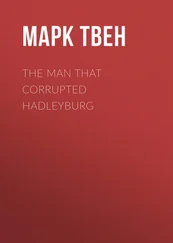Mark Twain - The Man That Corrupted Hadleyburg and Other Stories
Здесь есть возможность читать онлайн «Mark Twain - The Man That Corrupted Hadleyburg and Other Stories» весь текст электронной книги совершенно бесплатно (целиком полную версию без сокращений). В некоторых случаях можно слушать аудио, скачать через торрент в формате fb2 и присутствует краткое содержание. Год выпуска: 2004, Жанр: Классическая проза, Юмористическая проза, на английском языке. Описание произведения, (предисловие) а так же отзывы посетителей доступны на портале библиотеки ЛибКат.
- Название:The Man That Corrupted Hadleyburg and Other Stories
- Автор:
- Жанр:
- Год:2004
- ISBN:нет данных
- Рейтинг книги:4 / 5. Голосов: 1
-
Избранное:Добавить в избранное
- Отзывы:
-
Ваша оценка:
- 80
- 1
- 2
- 3
- 4
- 5
The Man That Corrupted Hadleyburg and Other Stories: краткое содержание, описание и аннотация
Предлагаем к чтению аннотацию, описание, краткое содержание или предисловие (зависит от того, что написал сам автор книги «The Man That Corrupted Hadleyburg and Other Stories»). Если вы не нашли необходимую информацию о книге — напишите в комментариях, мы постараемся отыскать её.
The Man That Corrupted Hadleyburg and Other Stories — читать онлайн бесплатно полную книгу (весь текст) целиком
Ниже представлен текст книги, разбитый по страницам. Система сохранения места последней прочитанной страницы, позволяет с удобством читать онлайн бесплатно книгу «The Man That Corrupted Hadleyburg and Other Stories», без необходимости каждый раз заново искать на чём Вы остановились. Поставьте закладку, и сможете в любой момент перейти на страницу, на которой закончили чтение.
Интервал:
Закладка:
'Without money and without price.' Those used to be the terms. Mrs. Eddy's Annex cancels them. The motto of Christian Science is 'The labourer is worthy of his hire.' And now that it has been 'demonstrated over,' we find its spiritual meaning to be, 'Do anything and everything your hand may find to do; and charge cash for it, and collect the money in advance.' The Scientist has on his tongue's end a cut-and-dried, Boston-supplied set of rather lean arguments whose function is to show that it is a Heaven-commanded duty to do this, and that the croupiers of the game have no choice by to obey.
The Trust seems to be a reincarnation. Exodus xxxii.4.
I have no reverence for Mrs. Eddy and the rest of the Trust—if there is a rest—but I am not lacking in reverence for the sincerities of the lay membership of the new Church. There is every evidence that the lay members are entirely sincere in their faith, and I think sincerity is always entitled to honour and respect, let the inspiration of the sincerity be what it may. Zeal and sincerity can carry a new religion further than any other missionary except fire and sword, and I believe that the new religion will conquer the half of Christendom in a hundred years. I am not intending this as a compliment to the human race, I am merely stating an opinion. And yet I think that perhaps it is a compliment to the race. I keep in mind that saying of an orthodox preacher—quoted further back. He conceded that this new Christianity frees its possessor's life from frets, fears, vexations, bitterness, and all sorts of imagination-propagated maladies and pains, and fills his world with sunshine and his heart with gladness. If Christian Science, with this stupendous equipment—and final salvation added—cannot win half the Christian globe, I must be badly mistaken in the make-up of the human race.
I think the Trust will be handed down like the other papacy, and will always know how to handle its limitless cash. It will press the button; the zeal, the energy, the sincerity, the enthusiasm of its countless vassals will do the rest.
IX
The power which a man's imagination has over his body to heal it or make it sick is a force which none of us is born without. The first man had it, the last one will possess it. If left to himself a man is most likely to use only the mischievous half of the force—the half which invents imaginary ailments for him and cultivates them: and if he is one of these very wise people he is quite likely to scoff at the beneficent half of the force and deny its existence. And so, to heal or help that man, two imaginations are required: his own and some outsider's. The outsider, B, must imagine that his incantations are the healing power that is curing A, and A must imagine that this is so. It is not so, at all; but no matter, the cure is effected, and that is the main thing. The outsider's work is unquestionably valuable; so valuable that it may fairly be likened to the essential work performed by the engineer when he handles the throttle and turns on the steam: the actual power is lodged exclusively in the engine, but if the engine were left alone it would never start of itself. Whether the engineer be named Jim, or Bob, or Tom, it is all one—his services are necessary, and he is entitled to such wage as he can get you to pay. Whether he be named Christian Scientist, or Mental Scientist, or Mind Curist, or Lourdes Miracle-Worker, or King's-Evil Expert, it is all one,—he is merely the Engineer, he simply turns on the same old steam and the engine does the whole work.
In the case of the cure-engine it is a distinct advantage to clothe the engineer in religious overalls and give him a pious name. It greatly enlarges the business, and does no one any harm.
The Christian-Scientist engineer drives exactly the same trade as the other engineers, yet he out-prospers the whole of them put together. Is it because he has captured the takingest name? I think that that is only a small part of it. I think that the secret of his high prosperity lies elsewhere:
The Christian Scientist has organised the business. Now that was certainly a gigantic idea. There is more intellect in it than would be needed in the invention of a couple of millions of Eddy Science-and-Health Bible Annexes. Electricity, in limitless volume, has existed in the air and the rocks and the earth and everywhere since time began—and was going to waste all the while. In our time we have organised that scattered and wandering force and set it to work, and backed the business with capital, and concentrated it in few and competent hands, and the results are as we see.
The Christian Scientist has taken a force which has been lying idle in every member of the human race since time began, and has organised it, and backed the business with capital, and concentrated it at Boston headquarters in the hands of a small and very competent Trust, and there are results.
Therein lies the promise that this monopoly is going to extend its commerce wide in the earth. I think that if the business were conducted in the loose and disconnected fashion customary with such things, it would achieve but little more than the modest prosperity usually secured by unorganised great moral and commercial ventures; but I believe that so long as this one remains compactly organised and closely concentrated in a Trust, the spread of its dominion will continue.
VIENNA: May 1, 1899.
(1) After raising a dead child to life, the disciple who did it writes an account of her performance, to Mrs. Eddy, and closes it thus: 'My prayer daily is to be more spiritual, that I may do more as you would have me do... and may we all love you more and so live it that the world may know that the Christ is come.'—Printed in the Concord, N.H., Independent Statesman, March 9, 1899. If this is no worship, it is a good imitation of it.
(2) In the past two years the membership of the Established Church of England have given voluntary contributions amounting to $73,000,000 to the Church's benevolent enterprises. Churches that give have nothing to hide.
(3) I may be introducing the capital S a little early—still it is on its way.
IS HE LIVING OR IS HE DEAD?
I was spending the month of March 1892 at Mentone, in the Riviera. At this retired spot one has all the advantages, privately, which are to be had publicly at Monte Carlo and Nice, a few miles farther along. That is to say, one has the flooding sunshine, the balmy air and the brilliant blue sea, without the marring additions of human pow-wow and fuss and feathers and display. Mentone is quiet, simple, restful, unpretentious; the rich and the gaudy do not come there. As a rule, I mean, the rich do not come there. Now and then a rich man comes, and I presently got acquainted with one of these. Partially to disguise him I will call him Smith. One day, in the Hotel des Anglais, at the second breakfast, he exclaimed:
'Quick! Cast your eye on the man going out at the door. Take in every detail of him.'
'Why?'
'Do you know who he is?'
'Yes. He spent several days here before you came. He is an old, retired, and very rich silk manufacturer from Lyons, they say, and I guess he is alone in the world, for he always looks sad and dreamy, and doesn't talk with anybody. His name is Theophile Magnan.'
I supposed that Smith would now proceed to justify the large interest which he had shown in Monsieur Magnan, but, instead, he dropped into a brown study, and was apparently lost to me and to the rest of the world during some minutes. Now and then he passed his fingers through his flossy white hair, to assist his thinking, and meantime he allowed his breakfast to go on cooling. At last he said:
'No, it's gone; I can't call it back.'
'Can't call what back?'
'It's one of Hans Andersen's beautiful little stories. But it's gone fro me. Part of it is like this: A child has a caged bird, which it loves but thoughtlessly neglects. The bird pours out its song unheard and unheeded; but, in time, hunger and thirst assail the creature, and its song grows plaintive and feeble and finally ceases—the bird dies. The child comes, and is smitten to the heart with remorse: then, with bitter tears and lamentations, it calls its mates, and they bury the bird with elaborate pomp and the tenderest grief, without knowing, poor things, that it isn't children only who starve poets to death and then spend enough on their funerals and monuments to have kept them alive and made them easy and comfortable. Now—'
Читать дальшеИнтервал:
Закладка:
Похожие книги на «The Man That Corrupted Hadleyburg and Other Stories»
Представляем Вашему вниманию похожие книги на «The Man That Corrupted Hadleyburg and Other Stories» списком для выбора. Мы отобрали схожую по названию и смыслу литературу в надежде предоставить читателям больше вариантов отыскать новые, интересные, ещё непрочитанные произведения.
Обсуждение, отзывы о книге «The Man That Corrupted Hadleyburg and Other Stories» и просто собственные мнения читателей. Оставьте ваши комментарии, напишите, что Вы думаете о произведении, его смысле или главных героях. Укажите что конкретно понравилось, а что нет, и почему Вы так считаете.










